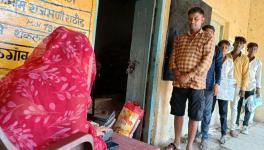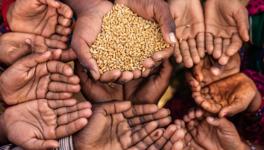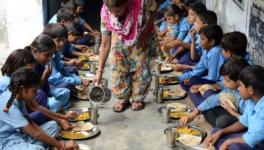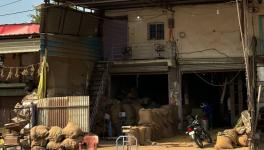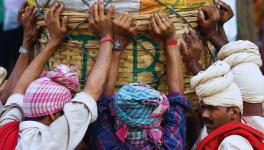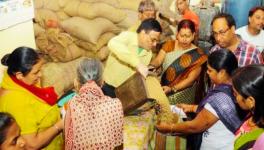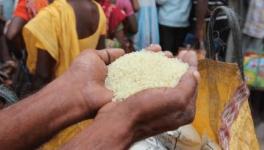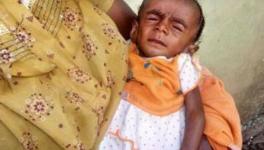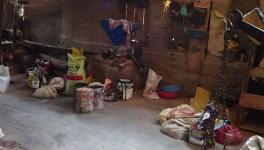Centre Can’t Ignore Global Hunger Index Report: Food Activists
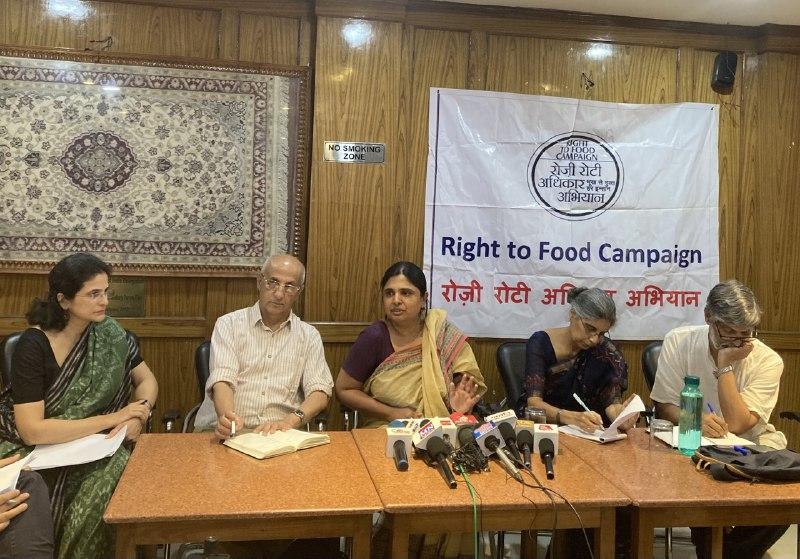
Food security and transparency activists address a press conference organised by the Right to Food Campaign at the Press Club of India, New Delhi, on Friday. Image: Ronak Chhabra.
New Delhi: Food security and transparency activists questioned the Centre’s rejection of the 2022 Global Hunger Index (GHI) report, in which India has fared worse than all countries in South Asia barring Afghanistan, on Friday and said that the government seeks to “deny” the alarming situation.
At a press conference at the Press Club of India in the capital, the activists said that in consistence with India’s ignominious ranking in the latest report, multiple surveys conducted in the recent past also highlighted that food insecurity in the country has “risen” after the pandemic despite additional support being provided by the government.
The conference was organised by the Right to Food Campaign, comprising organisations and individuals who work towards the realisation of the said right in the country.
India ranked 107 out of 121 countries on the GHI index, jointly published by Concern Wildlife and Welthungerhilfe, non-government organisations from Ireland and Germany, respectively. As per the report, published earlier last week, India is ranked behind its neighbours Nepal (81), Pakistan (99), Sri Lanka (64) and Bangladesh (84).
Slamming the findings, the Centre had said on Saturday that India’s ranking is part of a consistent effort to taint the country’s image as “a nation that does not fulfil the food security and nutritional requirements of its population”. In a statement, the women and child development ministry also alleged that the index “suffers from serious methodological issues”.
Social activists and civil society members said on Friday that the government cannot completely ignore the situation. “Our own surveys, conducted in the recent past, show that there is a dire situation in the country, especially among the marginalised communities, when it comes to levels of hunger and malnutrition,” said Dipa Sinha, who teaches at Ambedkar University and is actively involved with the said campaign, referring to the Hunger Watch surveys.
Conducted first in October-November 2020 and subsequently in December 2021-January 2022 with an aim to document the hunger situation in the country, the surveys showed that the majority of the respondents had reported lower levels of income, worsened nutritional quality and a decrease in the quantity of food consumed when compared to the pre-lockdown period.
Similarly, “the point is that when indicators [to measure] hunger are brought together, the situation in the country which is revealed is more or less same and it is not something to be proud of”, Sinha added.
Likewise, social activist Harsh Mander defended the GHI report saying that the index does not highlight that “there is no improvement,” but that “in relative terms, the country is falling down” among countries when levels of malnutrition and hunger are tracked.
The Centre had severely criticised the report’s methodology used to measure hunger saying that three out of the four indicators used for calculation of the index are related to the health of children and cannot be representative of the entire population.
They relate primarily to children viz. stunting, wasting and under five years mortality. The fourth indicator is the Prevalence of Undernourishment, which is an estimate of the proportion of the population whose habitual food consumption is insufficient to provide the dietary energy levels that are required to maintain a normal active and healthy life, the government had countered.
“But these are standard indicators that are used worldwide to measure levels of hunger and malnutrition,” Vandana Prasad, a paediatrician by profession who is also associated with Jan Swasthya Abhiyan, said while flaying the Centre for making “insensitive remarks” in response to the GHI report.
Prasad added that even if the Centre’s claims over “methodological issues” regarding the GHI hold true, a comparison among countries is still valid because the limitations of the report apply to all of them.
Contribution of PDS, MGNREGA Highlighted
The activists also demanded for universalisation of the Public Distribution System (PDS) and additional budget allocation for the Mahatma Gandhi National Rural Employment Guarantee Scheme (MGNREGA) considering rising inflation and unemployment and low wages.
The two schemes “have contributed significantly to food security and incomes of people”, said Nikhil Dey, of Mazdoor Kisan Shakti Sangathan. He demanded a substantial supplementary allocation for MGNREGA to meet the work demand in this fiscal.
RTI activist Anjali Bhardwaj lamented that the Centre is yet to redetermine coverage under the National Food Security Act. Consequently, more than 10 crore people who should have been issued ration cards had been left out of the purview of the food security net, she added.
Bhardwaj cited a government affidavit filed earlier in the Supreme Court that stated that the since the 2021 Census was delayed indefinitely due to the pandemic, no PDS expansion is possible till the drive is conducted. “Instead of waiting, the government can use its official population projections to expand PDS coverage,” she said.
Get the latest reports & analysis with people's perspective on Protests, movements & deep analytical videos, discussions of the current affairs in your Telegram app. Subscribe to NewsClick's Telegram channel & get Real-Time updates on stories, as they get published on our website.










